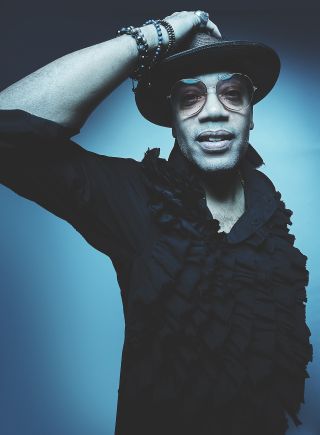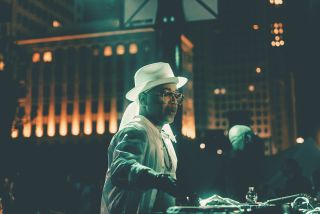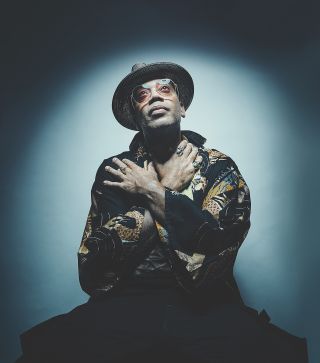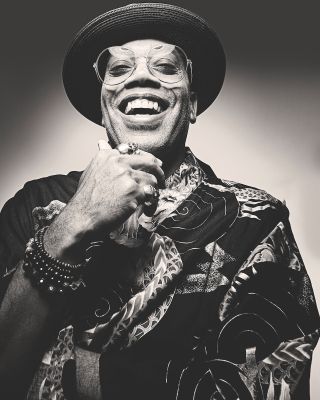Carl Craig: "People said techno was always supposed to be about the 808, the 909 and the 303. When I use a live drummer, they say it’s not techno because there’s no 808"
Second generation techno pioneer Carl Craig on the genre’s cultural visibility and how he’s keeping the flame alive

One of the leading visionaries behind Detroit techno’s second generation throughout the late ’80s and early ’90s, Carl Craig picked up the torch from the genre’s forefathers, The Belleville Three, releasing classic tracks under his own name and aliases such as Innerzone Orchestra.
Widely considered one of the go-to authorities on the genre, Craig is still pushing the boundaries with his innovative live sets and futuristic ethos behind his long-running techno label, Planet E Communications.
Alongside his encyclopaedic knowledge of electronic music past and present, Craig has been keen to promote awareness of Detroit techno culture through various multidisciplinary activities, from educational discussions at college campuses to being artistic director of the Detroit Electronic Music Festival.
Meanwhile, his booming, club-oriented Party/After-Party sound and light installations are a recent example of his foray into the world of ‘living art’.
Take us back to your involvement in techno’s second wave. How indebted are you to those who came before you and defined techno as we know it?
“Of course I wanted to display my influences from the techno, jazz and classical worlds, as well as being a Prince fanatic. I put all that stuff into whatever I did, whether it was making techno or rap music, which I could have done just as easily as techno because that was another sound that was emerging at the time, even though it wasn’t as big as we now know it.”
As a primarily electronic artist, how important was it for you to have been schooled on conventional instruments?
Get the MusicRadar Newsletter
Want all the hottest music and gear news, reviews, deals, features and more, direct to your inbox? Sign up here.
“You know, techno guys like Kevin Saunderson and Derrick May weren’t trained musicians, and Juan Atkins learned to play bass early on and that was his instrument. I was playing guitar, upright bass and drums, and had the experience of playing in bands and school orchestra ensembles, so it did play an important role for me. I usually do everything in a minor key, and learned how to translate sounds to synthesizers at my aunt’s house in Georgia with my guitar by learning guitar voicings on the piano.
"It’s funny because when I’m in front of a synthesiser I never start at E, I always start at C or F, because they’re the easiest keys outside of the black keys to play, but I think it was Martyn Ware who said that where they fucked up with synthesizers was by putting a keyboard on them [laughs]. If the Minimoog or Pro One had MPC pads instead of keys we’d have played the music totally differently.”

For people who have never visited Detroit and got a first-person feel for the city, how important do you feel techno has been to the region, culturally?
“It’s not the new Motown. People travelled from all over America in order to visit Motown and become a star, but Detroit techno is where people travel from Europe in order to meet the stars, such as Derrick May, Kevin Saunderson and Juan Atkins. So Motown was a much bigger deal than techno was and even though we knew techno in Detroit, it was still very underground – our own quiet little secret. New York kind of knew about it, but they were always into doing their own thing.
"It was something we were proud of and we followed the legends, but it didn’t have a huge impact because it wasn’t commercial music. Unlike rap, nobody thought they could become a millionaire from making techno and there are no techno millionaires, but J Dilla knew who we all were – if you listen to Big Booty Express, it’s like a slow version of a Cybotron record.”
How does techno culture permeate the city today? Are there fliers everywhere for techno-related events?
“Nah, there’s no flags to say techno after-party at 6am. The only signage that ever comes up about techno in Detroit is during the Movement Music Festival. Even though we have a song called Techno City, it was never as big as Detroit Rock City by KISS. By the time the music had made its way to being quite popular in Europe, we were going over there to promo Techno 2: The Next Generation compilation. That was during the early days of the travelling DJ and I remember being in the UK in 1990 and seeing David Morales play Pump Up the Jam at Heaven in Charing Cross. That was the hot record when I came over.”
How do you feel techno as a genre has morphed over the years?
“Even though techno had a street sound, it had a fantasy message about technology and things that are probably a bit nerdy. Early electro acts like Nucleus and Egyptian Lover had a similar vein, although Egyptian Lover was locked in with Uncle Jamm’s Army, which is where Ice T and Dr. Dre came from. Detroit didn’t have that same cultural shift; it was just appreciated by the nerds and English journalists, who had a habit of always looking for the next big thing. In many cases, a new name was put onto something that was already there. You put a little twist on something and it isn’t techno anymore; it’s progressive techno – just like jungle and drum & bass are the dark and light versions of each other.”

You were second generation techno and people speak about a third or fourth wave. Is there room for techno to reinvent itself again or have something come along that has a new classification?
“As a people we have to have some way of identifying what we’re interested in – if we go outside of classification we’ll no longer be able to call a sneaker a sneaker. I don’t have a problem with people saying that what they do is ‘future’ or ‘21st century’ techno as long as the respect goes back to the founders. We use paper money every day but don’t know who the hell invented it, but we should have an idea of why we stopped weighing gold and silver and started using coins.
"I want people to have that knowledge and understanding of the roots of techno visionaries like Derrick, Kevin, Juan, Cybotron or Jeff Mills. With anything that’s created, there’s always controversy because people are left out, so of course people get butt-hurt when some guy says he spearheaded the whole thing, but as long as you talk about techno and its founders then people will get curious and want to find out about that history.”
After-Party is an experience that you can walk into and be immersed in based on my experience as a DJ or touring musician
Do you still have discussions with your techno peers on these topics?
“Derrick never really talks about it that much because he’s always so busy, but I always say to him that techno and jazz have many parallels in terms of how the fans relate to them. In the ’90s, people who were into techno had this idea that it was always supposed to be about the 808, the 909 and the 303. When Miles Davis started putting a wah pedal on his trumpet, people started losing their minds and saying that’s not jazz and I have that same parallel when I go on stage with Francisco Mora who uses a live drum set. They say it’s not techno because there’s no 808 or 909 on stage.”
In the past, genres were formed by the gear that artists used as much as the people using it. Is that as achievable now that technology has become so sophisticated and democratised?
“About 10 years ago, one of the fourth wave techno guys, Seth Troxler, said that Apple Loops is going to lead all music. Before, there were factory sounds that you could tweak and now you can chop up factory loops. As long as you think of using them in the same way as how J Dilla or DJ Premier took records and cut them up, you can change the flavour of things, but I also saw an article a couple of years ago about the emergence of AI and the future for music, and now everything sounds like everything else I hear on the radio.
"All they want to do is make sure they get a hit, and that’s what’s screwing things up because it’s so lazy. There might be a different producer’s name on a track, but it just sounds like the same beatmaker made a thousand tracks and changed the triplets on the hi-hats. So AI is here and what Seth said at the time was really valid.”

Would you say the problem is not so much the technology that artists use but that the industry model is not conducive to popularising people who are genuinely unique?
“Yes to the last part. The industry execs know that my 15-year-old kid listens to tracks on Spotify for 30 seconds, so they’ve got to get your attention in 30 seconds. Being esoteric or creative within those 30 seconds, especially with electronic music, is really difficult, so they just lean on whatever’s going to make it. Going one step further, they’re also looking at what the algorithm is going to accept. Popular demand has made the algorithm function in the way that it does, so if it says it’s got to sound like Drake or Taylor Swift, then it’s out of our hands.
I don’t have my whole playlist setup in the order of what I’m going to play; I can have the tracks there but I play them differently every night
"Swift is putting out music so fast that the quality level or likelihood of every track hitting the target means that help is definitely there to make it easier for that to happen, whether using Apple Loops or AI. They’re now living the same serious techno dream that we were back in the ’90s when we adapted to the sound of whatever synths we could afford to make our music sound as futuristic as possible. What they’re doing now is just using the technology that spits it out to make it easier for them to keep generating hits. On a Detroit level, if Motown was still around today as it was in the ’70s, they’d be doing exactly the same thing.”
As the label owner of Planet E Communications, how have you had to adapt to some of the current industry challenges?
“I recently finished a book from the vice president of a big disco label from the ’70s called Casablanca Records, and if I implemented everything they were doing at the time I wouldn’t even be able to call Planet E a record label. They were talking about million dollar budgets for releases that didn’t even become big, but I never had the kind of money. I came from the viewpoint of it being guerrilla warfare and doing remixes to stay in business. Adapting to how formats have changed has always been part of the music game, and like I said, I can’t call Planet E a label after reading that book.
"For my music game, when streaming came around I saw that people were relating 300 sales to being a hit and that really pissed me off. I didn’t want to play the game anymore because how does it make sense for me to put out something in physical form that sells 300 copies worldwide? There’s no art to doing that. Kevin Saunderson talked about pressing thousands of records, throwing them into the trunk of his car and selling them on the streets of Chicago before coming right back to Detroit to buy some more. That sounds interesting and fun – fighting to sell 300 records to some place 5,000 miles away sounds more like trading cards to me.”
What inspired your All Black Digital series and how do you showcase it?
“It started out during Covid as All Black Vinyl as a means to express myself, but also to promote Black History Month, which has been a big deal in the US since I was a kid. I wanted to post music on my Instagram account that people didn’t know anything about, so I played one piece of vinyl each day for a month and got a really good response. That was a lot fun, and it felt like I was giving people something during a time when a lot of them needed lifting up.”
We’ve read that you’ll be giving a series of talks to various college students in Michigan State and New York during Black History Month. What lies at the core of these lectures and in what way are you hoping to educate and inspire?
“For me, educating is the same as what we’re doing right now, which is having a discussion and trading conversation. That’s what I expect to do at MSU and NYU for the lectures. I’m not somebody that can stand in front of a whiteboard and start scribbling.
“King Britt is doing a great programme at University of California, San Diego and he told me a few times that I should do this teaching thing, but I can’t stand in front of anybody with the calculated idea of what I’m going to do because, as an artist, I don’t do that. When I DJ, I don’t have my whole playlist setup in the order of what I’m going to play; I can have the tracks there but I play them differently every night.”
Can you comment on the Frankfurt museum MOMEM and accusations of whitewashing when it comes to how the origins of techno are perceived?
“It’s a techno museum in Germany, so what the hell else are they going to say [laughs]? They’ve done their work to reach out to all of us here and we’ve donated some things, but it’s a German museum, not an American or world museum, so of course they’re going to focus on all of their techno groups.
“They put a heavy impact on Kraftwerk, obviously, but then we were all influenced by Kraftwerk and hyping them up, too. Kraftwerk are typically thought of as the originators of, not just techno, but virtually all genres of electronic music. Is that misguided, or is there a sphere of influence that’s less obvious in terms of what techno ultimately became?
“Mark Ernestus from Basic Channel and I had this discussion some years back and I said to him, ‘Hey man, Kraftwerk’s fingerprint is on all modern music in some way or another’, but he comes from a reggae background and hears more Sly & Robbie than Kraftwerk. When he said that, we had a debate, and it seems clear that they did have as big an influence – maybe because of the stronghold that rap has with pop music.
Kraftwerk are typically thought of as the originators of, not just techno, but virtually all genres of electronic music. Is that misguided, or is there a sphere of influence that’s less obvious in terms of what techno ultimately became?
"That Sly & Robbie influence comes from Kool Herc and all the Jamaican-born pioneers of hip-hop and I use Kraftwerk, of course, because of Afrika Bambaataa and the Lil Kim record that used the We Are the Robots sample. We saw what Kraftwerk was doing as being real, but when we went to the UK people in London thought The Model was a novelty record. We were hyped about it, because the gangs were getting down to it, but Pocket Calculator was also a novelty record. If you look at Sly & Robbie, even their corniest stuff isn’t as corny as Pocket Calculator, so I think there’s probably more realness to what they did.”
What other electronic artists were influential to you at the time?
“We loved Gary Numan. He had a novelty record in Cars, but that was a huge record. I probably knew of Cars before I knew Kraftwerk. The three singles I used to listen to at the time were Cars, I’m Coming Out by Diana Ross and Wide Receiver by Michael Henderson. I used to travel everywhere with those little seven-inch singles.
“The Human League’s Don’t You Want Me was a big track for us here, alongside Things That Dreams Are Made Of, and M.K. Mark Kinchen is a huge Depeche Mode fan, so stuff like Master and Servant in the early ’80s had a big impact. Another band that did a lot of really cool things, albeit not from the UK, is Yello. They were thought of as silly and kind of gimmicky, but they had a lot of really cool ideas and I know Boris [Blank] and love him to death.”
You clearly have fond memories of that period…
“I have no problem talking about the history and impact of those records. Some people get so snobby about music, but these are the things that developed me, in the same way that I developed from getting kicked out of high school because I was going to record stores and playing video games. There’s no shame in that because I’m still alive, travelling the world and doing more than a lot of people who were in school every day and went on to work in the plant at Ford or General Motors.”
What can you tell us about the techno museum, Exhibit 3000, owned by Mike Banks?
“Is that what he calls it? I didn’t even know – I just know it as the Techno Museum. He has some instruments in there from Juan, Derrick, Kevin and Jeff Mills, and I believe he has Ron Murphy’s cutting lathe that was used to cut most of our records during the ’90s. It’s great that Mike’s done that, but the grim reality that comes from having a museum is that in order to take things to the next level you constantly need funding. Even though Mike is a Detroit techno legend, it’s still hard for him to try to fund it out of his own pocket.”
Have you bumped up against a similar problem with your own Party/After-Party sound and light installation?
“I lucked out because Dia Beacon was in all the way. They found the money to make it happen and I didn’t even really know how much it cost to do the project until it moved to the artist-founded MOCA museum in Los Angeles. My background is sound and music frequencies and trying to put together out-of-tune samples in a way that makes sense, so people shouldn’t expect to walk into a Party/After-Party installation and see a white wall gallery. I have a friend who was a director of a modern art museum here in Detroit, and her background is dealing with people who don’t believe art is art if you can’t hang it on a white wall.
Art has to represent my experiences. I’m not going to paint something and say, hey, look at my art – I’m going to give you an environment that I live in every week in a way that you’ve never seen before
"I say no, I have a movement that I call pro-black walls, which is the anti-white wall idea that art shouldn’t be so regimented. With my philosophy, art has to represent my experiences. I’m not going to paint something and say, hey, look at my art – I’m going to give you an environment that I live in every week in a way that you’ve never seen before.
"Party/After-Party is an experience that you can walk into and be immersed in based on my experience as a DJ or touring musician. For me, this puts art into another tagline where you can experience it and make up your mind whether you want to call it living art or a sculpture, albeit on a grandiose scale – a 20,000 square foot sculpture [laughs].”

Finally, how has your studio evolved over the years? Are you still reliant on tools that you used in the early ’90s, like the SH-101 or classic Roland groove boxes?
“I have an SSL desk, some huge PMC speakers and find that I do a lot of stuff on my iPad now. The reason for that is I can travel with it, mess around with ideas and, hopefully, expand on them by taking them from the iPad’s DAW to Logic, Ableton or an MPC before integrating all of the classic gear. So many times I’ve tried to work on a plane in economy class when somebody puts their seat back and suddenly the computer keyboard is on my chest, so the iPad makes it much easier for me to be able to touch and do the things I need to within a confined space.
"It goes back to that statement I mentioned about Martyn Ware, the thing that I can’t stand about laptops is the computer keyboard because when I try to find a place to set up in my hotel room, the keyboard’s always in the way. I sometimes carry around a BeatStep Pro or a little Roland J-6 synth and love how the interface for the iPad is right there. I can just touch it, sync those instruments and do what I need to do.”
Are you working on new music right now?
“Like every writer and artist, I’ve gone through dry spells, but I’ve been working towards releasing new music for a while, so it’s just about trying to find the right time when it will all flow.”
For tickets for future Carl Craig events, including Detroit Love in NYC and DC and his all-night-long set in Miami, visit this website.



“Who wants to tell him?”: Busking drummer unknowingly performs Chili Peppers song in front of Chad Smith

“The way I play guitar, every time I play with a session musician, they’re like, ‘What are you doing? What chords are you playing?’”: Beabadoobee discusses her unorthodox guitar style and how it helped her to gel with Rick Rubin
Most Popular








